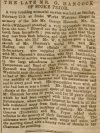Stokkie
master brummie
We have found an associate of Joseph Sturge (who was himself Quaker), George Hancock b. 1820 d.13 Jan 1894. He was superintendent of Stoke Prior Reformatory from 1852 -1873. The Bromsgrove Advertiser reports his funeral at St Michael and All Angels, Stoke Prior. 'The remains of the deceased were interred in Stoke Prior Churchyard.'
There was also a memorial service at Stoke Works Wesleyan Chapel. George Hancock was a noted Temperance Speaker in Worces. Glocs. Birmingham and Manchester.
There is no gravestone that we can find in the churchyard. Does this suggest that his religious views precluded a visible memorial? He seems to have been a man of means, farming locally. But he once saved 12 shillings walking to preach in Gloucester rather than get the coach and donating the money to the church he preached in. I would welcome comments and advice. Could 'interred' mean that he was buried in the churchyard without a memorial?
Stokkie/Derek
There was also a memorial service at Stoke Works Wesleyan Chapel. George Hancock was a noted Temperance Speaker in Worces. Glocs. Birmingham and Manchester.
There is no gravestone that we can find in the churchyard. Does this suggest that his religious views precluded a visible memorial? He seems to have been a man of means, farming locally. But he once saved 12 shillings walking to preach in Gloucester rather than get the coach and donating the money to the church he preached in. I would welcome comments and advice. Could 'interred' mean that he was buried in the churchyard without a memorial?
Stokkie/Derek
Last edited:


